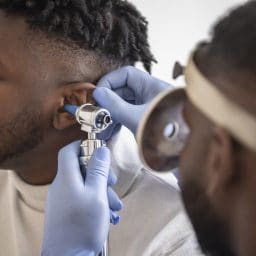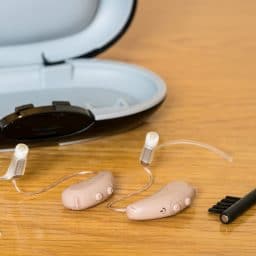Can Hearing Aids Help with Balance Issues?

If your inner ears become damaged, it can affect more than just your hearing; it can impact your balance, too. This is because both the hearing and balance systems are housed within the inner ear. Fortunately, both hearing and balance problems have been shown to be treatable with hearing aids. How We Hear Within the…
When is a Cochlear Implant Necessary?

If you have moderate to severe hearing loss, you may be a candidate for a cochlear implant. Let’s examine what a cochlear implant is and how it can help people who struggle to hear, but who don’t benefit from traditional hearing aids. What are Cochlear Implants? Cochlear implants are small electronic devices that use an…
How Do Hearing Aids Help Manage Tinnitus Symptoms?

Tinnitus is a phantom ringing, roaring, whistling, hissing, humming or buzzing sound with no external sound source. Unless the underlying cause of tinnitus can be identified and treated, there is no cure for it. Fortunately, there are plenty of tinnitus management options, including wearing hearing aids. The Relationship Between Tinnitus & Hearing Loss According to…
ADHD & Hearing Loss in Children: What’s the Connection

Does your child have difficulty behaving and completing assignments at school? If so, you may want to have them screened for a potential learning disability like attention-deficit hyperactive disorder (ADHD) and also hearing loss. It’s common for one of these conditions to be mistaken for the other due to both sharing many symptoms. We review…
Are Hearing Loss and Cognitive Decline Linked?

Untreated hearing loss is linked to a variety of different health risks, including: Problems with balance Higher risk of injury from falls Higher levels of anxiety and depression There is also solid evidence to suggest that hearing loss is associated with a greater risk of cognitive decline. One study published in JAMA Internal Medicine found…
What to Know About Hearing Aid Repairs and How to Avoid Them

Just like with any other device, hearing aids sometimes run into problems that need repairs. Sometimes an accident happens like you forget to take them out before going for a swim at the Bellevue Aquatic Center. Other times, normal wear and tear just take its toll. Thankfully, there are several steps you can take to…
Hearing Aids and the Holidays

We can’t believe how fast time is flying by. It feels like just yesterday it was summer, and now we’re right amid the holiday season. Whether you’re planning to visit family out of state, hosting a big holiday party or taking in the sights at Snowflake Lane, you’re almost certainly planning more activities that involve…
Hearing Matters at All Ages

Seeking treatment for hearing loss is important for your physical, mental and emotional wellbeing. Unfortunately, many people put off treatment for their hearing loss due to fear of stigma around hearing aids and looking “old.” Below we dispel some myths about hearing loss and discuss the importance of protecting your hearing, getting diagnosed and treated…
How to Help a Loved One with Hearing Loss

Hearing loss can sneak up on a person. It can develop slowly for years, and often people aren’t aware they are experiencing it at first. Some early signs a person may be struggling with hearing loss include: Frequently asking people to repeat themselves. Especially in louder environments or situations where multiple people are speaking. Listening…
Why Do Loud Sounds Startle People with Hearing Loss?

You might assume that people with hearing loss would be less bothered by loud noises than those with normal hearing. However, this is not the case. In fact, many people with hearing loss actually perceive loud noises as more intense or startling than they did before they experienced hearing loss. This may sound odd, but…